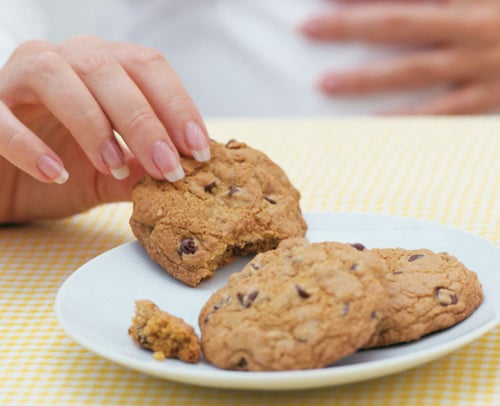Some women sail through pregnancy without any
symptoms at all, while others suffer from every possible ailment. The
good news is that whatever your complaint, there are ways to cope.
However, if you are at all worried, talk to your doctor.
Easing morning sickness
It’s safe to feel sick
There is evidence to
suggest that women who experience severe nausea are less likely to
miscarry; morning sickness is believed to be caused by high levels of
pregnancy hormones, which help to keep the pregnancy safe.

Symptoms are often worse when you are hungry, so eat little and often to stabilize your blood-sugar levels Drink plenty of water—dehydration can make nausea worse Eat a little first thing in the morning before you get out of bed Avoid fatty foods and junk foods, which seem to make symptoms worse Ginger is a traditional remedy for morning sickness; you can drink ginger tea or ginger ale, or chew crystalized ginger until symptoms pass Take vitamin B6 regularly, since deficiency appears to be a factor Invest in a motion-sickness wristband;
strap it onto your wrist so the plastic button presses against an
acupressure point on your inside wrist—some research suggests this can
help ease nausea and vomiting Get plenty of sleep and take regular rests—this can make a big difference in the way you feel Try to remember that almost all cases of morning sickness pass by the end of the first trimester, when your hormones settle down Dry cookies or crackers seem to help ease nausea for many women
Coping with constipation
Make sure you drink plenty of water, which helps to keep things moving in your bowels Fiber is crucially important—aim for five or six servings of fruit and vegetables a day, preferably with skins, and boost your intake of whole grains If you need a little help, psyllium or ispaghula husk (Plantago ovata) are effective unblockers, and safe during pregnancy Keep up the exercise, which will help to keep you regular Try a little reflexology:
massage the base of the heel of your foot, and the arch, pushing your
thumb down evenly and deeply; several studies have found that this
really works Massage your abdomen
with a couple of drops of grapefruit or bergamot oil blended with a
teaspoon of slightly warmed olive oil—this will help to stimulate bowel
movements Ask your doctor if he can adjust your iron-supplement dosage, if need be; iron can cause constipation
Reducing swelling and edema
Exercise regularly—this helps to encourage healthy circulation, and disperse fluid buildup Drink plenty of fresh water—this is, without doubt, the best natural diuretic around Put your feet up regularly to take the pressure off your circulatory system and direct the blood and fluid to your baby Reduce your salt intake, and make sure you are getting enough protein, both of which can discourage fluid retention Include lots of natural diuretics in your pregnancy diet, such as asparagus, pumpkin, onions, grapes, beets, parsley, green beans, pineapple, and garlic B vitamins, found in good levels in whole grains in particular, can act as a natural, mild diuretic A good massage can reduce fluid buildup and encourage healthy circulation
Relieving heartburn
Eat little and often, to avoid overfilling your tummy Eat a slice of fresh pineapple (not canned) after every meal; the digestive enzymes it contains work wonders to prevent acid buildup Avoid lying down right after meals, which can cause acid to enter the upper digestive tract Avoid citrus fruits, or, if you do eat them, make sure you do so along with a little protein, to discourage acid buildup Coffee, tea, and carbonated drinks will make matters worse, so skip them Elevate the head of your bed by 4–6 inches (10–15 cm) to lower your risk of heartburn while lying down Avoid fatty and fried foods, which take longer to digest, giving more time for acid to swish around your digestive system Slippery elm powder mixed with water or milk will protect the mucus membranes lining your digestive system, and ease symptoms Sad but true: chocolate can cause heartburn! If all else fails, take an antacid after meals, or as required—choose calcium carbonate, which is generally considered safe in pregnancy
Remember that heartburn usually ceases the moment you give birth
Handling headaches
Eat and sleep enough—deficits during pregnancy can cause headaches Get a little exercise, which encourages the pain-killing hormones, endorphins, and improves circulation Drink plenty of water—many headaches are caused by dehydration Apply a cold compress at the base of your neck Eat fresh, whole foods to prevent headaches caused by blood-sugar swings If you experience blurring of vision, vomiting, bright lights, or a headache that simply won’t go away, see your doctor immediately
Beating back pain

Shift your position as often as you can, to avoid putting strain on any one part of your body Put a footstool (or even a pile of books) under your feet to reduce the pressure on your back when sitting When lying down, raise your feet with some pillows Try relaxation exercises, such as clenching and relaxing every part of your body in order, from head to toe Yoga and other stretching exercise will help loosen areas of tension Exercise encourages circulation, which disperses areas of congestion that cause pain; it also encourages the “feel-good” hormones to flow Bend at the knees when lifting heavy objects such as groceries or toddlers Don’t sit or stand for long periods without a break Try placing an ice pack on your back for a few minutes, several times a day, to reduce inflammation
|